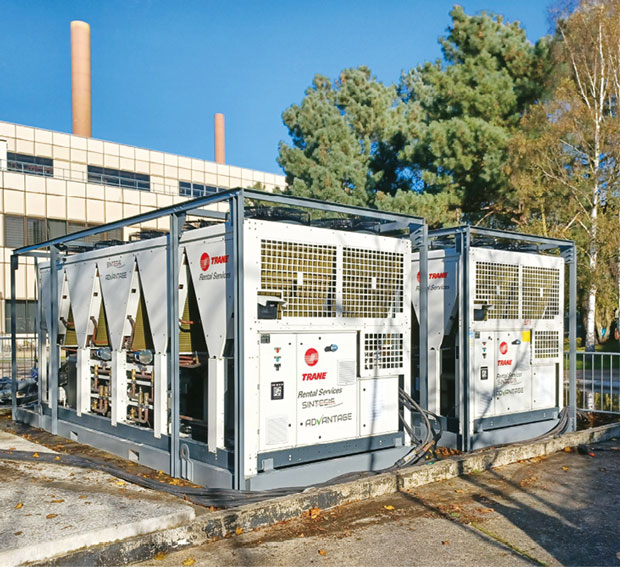 Rob McCauley, Business Excellence Manager at Trane UK, outlines the main reasons why heat pumps should be rising up the FM agenda
Rob McCauley, Business Excellence Manager at Trane UK, outlines the main reasons why heat pumps should be rising up the FM agenda
With sustainability rapidly becoming the biggest talking point in UK boardrooms – the roll out of electric heat pumps should be a major topic for the business as well as the domestic market.
Much of the publicity around heat pumps centres on a government target for 600,000 to be installed in domestic homes a year by 2028. Only recently the National Audit Office warned that progress is nowhere near fast enough.
But what about business premises? There are 5.6 million private sector businesses in the UK according to government figures. The government itself owns over 141,000 built assets including schools, hospitals, offices and prisons, responsible for almost nine per cent of emissions from buildings.
Overall, heating is responsible for more than a third of UK carbon emissions – and so the decarbonisation of heat is an obvious way for businesses to reduce emissions at their commercial premises.
Here are the main trends I believe are rapidly driving interest in heat pumps from businesses of all sizes:
GROWING SCRUTINY OF NET ZERO ROADMAPS
It wasn’t long ago that publishing your business’ Net Zero road map or Net Zero commitment put you at the top of the sustainability tree. Not anymore.
A recent report revealed 80 per cent of UK listed firms say they are committed to Net Zero by 2050; and the Federation of Small Businesses says many of the country’s 5.5 million SMEs are following suit.
Now the focus is not on who’s got a road map – but on whether businesses are delivering on their promises. There is an increasing demand that those who produce and publish Net Zero policies now focus on taking real action to achieve it. Decarbonising the way commercial premises are heated, or cooled, is an obvious place to start and we are seeing a steep increase in enquires from businesses about switching to a heat pump.
A GROWING TREND FOR RENTAL SOLUTIONS MAKE THEM EASIER TO ADOPT
As businesses become increasingly interested in the decarbonisation of heat, the option to rent rather than purchase a heat pump for their commercial premises is growing, too.
It’s an option rarely available to domestic homeowners but one which is growing in popularity in the commercial market.
Many businesses are willing to consider switching to a heat pump but need to be convinced to take the step. Rental is therefore becoming an attractive alternative, providing a chance to measure and test the benefits without a big initial outlay.
Heat pump technology is also moving fast, so by renting instead of buying, a business will no longer be tied into a product which may be overtaken by future advances in technology.
NEED FOR COMMERCIAL COOLING AS WELL AS HEATING IS DRIVING UPTAKE
Climate change is increasingly delivering hot summers as well as wet and cold winters, and that means cooling buildings is an issue, too.
If you look at the highest temperatures ever recorded in the UK, four of the top five hottest days in history have come in the last four years. Including 40.3 degrees in Lincolnshire in July 2022.
Top five hottest days ever in the UK
- July 19th, 2022: 40.3 degrees celsius, Coningsby, Lincolnshire
- July 25th, 2019: 38.7 degrees, Cambridge
- August 10th, 2003: 38.5 degrees, Faversham, Kent
- July 18th, 2022: 38.2 degrees, Pitsford, Northants
- July 31st, 2020: 37.8 degrees; Heathrow, London
One of the big benefits of heat pumps is that they can be switched to provide cold water as well as hot water to work with air conditioning units. It’s the same technology in reverse – hot air in, cold air out.
We’re seeing this flexibility becoming a big incentive for switching to a heat pump. Higher temperatures in summer are a growing reality. Whether you refigure your heat pumps as an air conditioning unit or hire one for a temporary fix, the need is there.
PRESSURE (AND INCENTIVES) FROM GOVERNMENT
The bottom line is the country MUST be Net Zero by 2050. The Government target is not a promise, it’s a requirement – one that is enshrined in law. In Scotland the deadline is even sooner, set at 2045.
So, the closer we get to the end goal, the more stringent you can expect government policy to become – and the greater pressure businesses will be under to reduce their emissions.
We’ve already seen how big a topic heat pumps are in the decarbonisation of domestic homes; but now it should be rising up the agenda for businesses, too.
We expect to see an increased focus from government on how commercial premises are heated and cooled. Whether that takes the form of regulation or incentivisation we don’t yet know; but there’s no doubt businesses need to start thinking more deeply about the topic. Renting a heat pump now to test drive a solution is a trend that will only grow.





